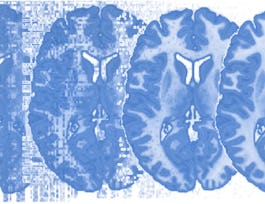Welcome! In this course learners will develop expertise in basic magnetic resonance imaging (MRI) physics and principles and gain knowledge of many different data acquisition strategies in MRI. In particular, learners will get to know what is magnetic resonance phenomenon, how magnetic resonance signals are generated, how an image can be formulated using MRI, how soft tissue contrast can change with imaging parameters. Also introduced will be MR imaging sequences of spin echo, gradient echo, fast spin echo, echo planar imaging, inversion recovery, etc.


MRI Fundamentals
Taught in English
Some content may not be translated
25,144 already enrolled
(381 reviews)
Details to know

Add to your LinkedIn profile
6 quizzes
See how employees at top companies are mastering in-demand skills


Earn a career certificate
Add this credential to your LinkedIn profile, resume, or CV
Share it on social media and in your performance review

There are 6 modules in this course
Welcome! This first week you will be introduced to the course and key principles of mri. You will learn what is mri and the major components of mri.
What's included
2 videos1 quiz
This week, you will explore what is magnetic resonance phenomeon. We will also guide you to what is relaxation and how RF apply to cause magnetic resonance.
What's included
4 videos1 quiz
In this module, you will learn signal processing theory. You will be exposed to the most important concepts in mri which contain fourier transform and nyquist sampling therom.
What's included
5 videos1 quiz
In lecture 4, we will expose you to how to sequence gradient pulses to get an mr image. You will also learn about sequence gradient pulses which include slice selection, frequency encoding and phase encoding.
What's included
5 videos1 quiz
In this week, learners will get to know how soft tissue contrast can change with imaging parameters. We will also guide you what is field of view and how to measure resolution.
What's included
5 videos1 quiz
In this module, you will learn about mri data acquisition strategies. Also, you will be exposed to MR imaging sequences of spin echo, gradient echo, fast spin echo, echo planar imaging, and inversion recovery.
What's included
5 videos1 quiz
Instructor

Recommended if you're interested in Research

Yale University

Johns Hopkins University

University of California, Irvine

The University of Edinburgh
Why people choose Coursera for their career




Learner reviews
Showing 3 of 381
381 reviews
- 5 stars
68.32%
- 4 stars
21.46%
- 3 stars
7.06%
- 2 stars
1.57%
- 1 star
1.57%
New to Research? Start here.

Open new doors with Coursera Plus
Unlimited access to 7,000+ world-class courses, hands-on projects, and job-ready certificate programs - all included in your subscription
Advance your career with an online degree
Earn a degree from world-class universities - 100% online
Join over 3,400 global companies that choose Coursera for Business
Upskill your employees to excel in the digital economy
Frequently asked questions
Access to lectures and assignments depends on your type of enrollment. If you take a course in audit mode, you will be able to see most course materials for free. To access graded assignments and to earn a Certificate, you will need to purchase the Certificate experience, during or after your audit. If you don't see the audit option:
The course may not offer an audit option. You can try a Free Trial instead, or apply for Financial Aid.
The course may offer 'Full Course, No Certificate' instead. This option lets you see all course materials, submit required assessments, and get a final grade. This also means that you will not be able to purchase a Certificate experience.
When you purchase a Certificate you get access to all course materials, including graded assignments. Upon completing the course, your electronic Certificate will be added to your Accomplishments page - from there, you can print your Certificate or add it to your LinkedIn profile. If you only want to read and view the course content, you can audit the course for free.
You will be eligible for a full refund until two weeks after your payment date, or (for courses that have just launched) until two weeks after the first session of the course begins, whichever is later. You cannot receive a refund once you’ve earned a Course Certificate, even if you complete the course within the two-week refund period. See our full refund policy.


